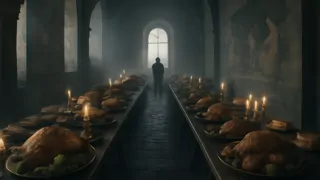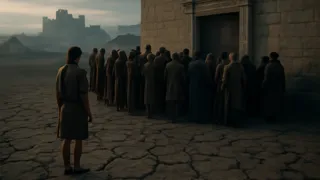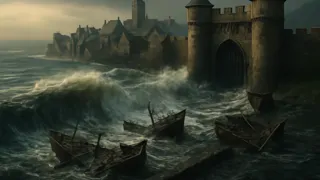Introduction
Perched on the shifting sands of the Dutch coast, the port of Stavoren carried a promise of trade and prosperity. In the heart of this bustling harbor stood the castle of Lady Freule, a noblewoman of legendary beauty and vast fortune. For generations her family had governed the fertile lands nearby, overseeing a thriving network of merchant vessels, windmills turning in the breeze, and grain shipments that sustained villages across the flat lowlands. When Freule inherited her title at the turn of spring, the townsfolk spoke of renewal, hoping her youth and ambition would spark innovation, charity, and goodwill across the county. Yet as seasons passed, a hush fell over the golden fields. Harvests went unsold in distant warehouses while the Lady's table groaned under endless feasts of roasted fowl, sweet wine, and sugared pastries. Rewards came only to those who served her lavish gatherings and adorned her halls with silk and gold. Beyond the castle gates, farmers and fishermen whispered of hunger, of shuttered granaries, polluted springs, and empty larders. They knocked at the gate with trembling hope, bearing baskets of wilted herbs or tired plows, only to meet complaint or contempt from the Lady herself. Clouds gathering over mudflats brought the cries of gulls and the scent of brine, warnings unheard by the Lady. She seldom trod the muddy roads or tended to the fishermen returning with empty nets; she remained above the world she ruled, believing her wealth insulated her from blame. In this fragile landscape of ebbing kindness and rising tension, the balance between human compassion and untempered pride would soon be tested. For as surely as the tides obey the moon, nature answers cruelty with its own reckoning. Thus begins the legend of the Lady of Stavoren, where greed consumes not just hearts but entire communities, and where the sea appears as the final arbiter of justice and mercy.
The Rise of Lady Freule
Lady Freule descended from a line of margraves who had weathered storms and sieges, yet she embodied a new spirit of ambition. Even as a child, her laughter echoed through the courtyard, bright as bells. She learned the language of merchants before the curves of court etiquette, investing in new trading ventures and shipwrights eager to ply the North Sea. Her youth was marked by promise; she endowed schools in nearby hamlets, commissioned windmills with graceful sails, and sponsored festivals that braided color and song into the long Dutch nights. Word of her vision attracted merchants from Bruges and Hamburg, who brought silks, spices, and rare glass. It seemed she would become the shining patroness of Stavoren, guiding prosperity to every doorstep. From sunrise to dusk, she strode through her rose gardens, naming blooms for her grandmother and reciting poetry learned by candlelight. Overseers noted her keen eye for balance, how she negotiated grain prices down to half a ducat. At county gatherings, she spoke of golden opportunities and pledged to build schools and bathhouses so villagers might learn to read and bathe without fear of illness. Under her care, banks in Harlingen and Franeker swelled with deposits, and Stavoren's guild halls flourished. She rode astride her favorite grey mare through wind-swept meadows dotted with wildflowers, stopping to counsel elders or jest with children, becoming legend among the marsh dwellers. Lantern-lit night watches listened for her impressions; travelers claimed her portrait graced every shop, dressed in emerald silks. Woven into her lineage was a sense of guardianship, a burden she bore with pride, promising to uplift the poorest with alliances stitched through kindness and commerce.\n\nBut soon the flicker of generosity became a roaring blaze of excess. Her hallways filled with tapestries imported at a king's ransom, her table staggered under vessels of candied fruit and imported wine, and her courtiers vied for places at her sumptuous banquets. Wealth that could have eased the labors of peasant families paid for carriages drawn by white stallions and chandeliers brimming with golden candlelight. Whenever merchants bore delicate crates of grain bound for the starving villages, she redirected them to secret cellars beneath her keep, seeing them as insurance against political threats rather than a lifeline for her people. While her debtors protested the ever-climbing taxes imposed to decorate her ballroom, she danced through moonlit nights, convinced that power lay in ostentation alone. Inside her kitchens, armies of cooks infused broth with saffron so rare it rivaled the sunset, and filled goblets with spiced wines heated by rare cinnamon. Tapestries hummed with threads of silver and copper, portraying scenes of triumph and conquest, never the quiet labor of sowing grain or fishing nets cast at dawn. While senators discussed famine at candlelit tables, Freule demanded entertainment: jugglers, musicians, foreign dancers. She refused to watch the hungry lines outside her keep, turning away knights who offered to escort her to the gates. If any commoner dared protest, guards expelled them like strays. Rumor spread that she set a price on the words 'I am hungry.' Critics among her own court whispered that her appetite for pageantry rivaled any king's. In place of charity, she built fountains that sprayed sweet mead, silver basins filled with almonds, candied figs cascading like waterfalls. She resembled a goddess of indulgence, unmoved by mortal need.\n\nIn the winding lanes beyond the castle walls, small children tugged at the hems of passing ladies, begging for bread crusts. Fishermen returned from the sea skinnier than their nets, houses lay shuttered against dust storms, and midwives whispered of malnourished mothers and feeble infants. Yet Freule remained aloof, preoccupied with mirth and guileless smiles at the feasts she extended to visiting nobles. Rumors spread of her refusal to heed the council's pleas. Some said she toyed with the idea of selling her last sacks of wheat for a golden statue to grace her courtyard. Signs of unease rippled through the marshes: crows swooped low over barren fields, and the windmills ground to a dull halt. Even the oldest seer in the village warned that the land would recall the debts owed by the proud, though Freule only laughed and ordered the granaries locked until she commanded otherwise.\n\nHer reputation soared among foreign courts, summoned abroad for audiences by princesses and potentates, yet each journey carried her farther from the land she governed. She boarded lavish galleons painted with heraldic beasts, trading the sight of scorched fields for emerald coasts. When she returned, she found the same requests waiting at her gates, as if her silence had been a snare. Letters spoke of children too weak to attend harvests, livestock succumbing to thirst, and elders praying for a single drop of mercy. But Freule, intoxicated by her own grandeur, dismissed these missives as faint offers of flattery, believing the pleas to be exaggerated to inflate her generosity once she deigned to respond. No measure could restore the fraying bond between sovereign and subjects, severed by the Lady's neglect.

Famine's First Shadow
As spring unfolded and skies lingered stubbornly clear, the fields around Stavoren betrayed no promise of rain. Pristine white windmills ground to a pathetic crawl, turning blades that seemed to catch no breath of wind. The canals, once brimming with swift currents, slowed to puddles whose edges cracked beneath the sun's unrelenting gaze. Farmers with faces darkened by toil stood at the foot of their parched furrows, questioning where the water had gone and why their crops lay flat upon the earth. Each dawn began with hope, but by sundown the once-lusty stalks of barley and flax curled in defeat, bereft of life. Water barrels emptied too swiftly, and the wells, once deep and cool, yielded only scummy mud. Livestock wandered the empty paths, their ribs visible beneath sagging flanks, issuing mournful bleats that drifted on the wind like a dirge. Amid the waning green of fields, the people felt the first pangs of panic. Children watched their mothers tear threads from their last warm cloaks into feed for hungry chickens, while elders muttered old prayers by the dike. As the breeze stilled, gulls circled overhead, their shrill cries bouncing off empty docks. Salt marshes, usually a tangle of reeds, shriveled into brittle stalks that crackled under each footstep. The harbor's wooden piers sagged as water levels dropped, leaving masts to lean crookedly toward mud flats. Saltworkers combed the exposed seabed, harvesting nothing but desiccated crusts of old brine. And far off, shepherds guided flocks across the dunes, only to find their sheep stumbling through cracked clay. In midnight watches, some declared they saw flickers of lantern baited by spirits, harbingers of famine foretold by the coastal elders.\n\nWord of the worsening crisis reached the castle in the form of petitions sealed with humble symbols: a grain ear sketched in charcoal, a handful of dried peas tied with a leather cord. In the antechamber, scribes recorded the pleas, and guards laid them at Lady Freule's door. Yet she sat enthroned beneath towering tapestries, her hair braided with pearls, and dismissed the petitions as prompted by weakness. When her steward spoke of reserving a month's supply of grain for the villagers, she unleashed a torrent of scorn, branding them lazy and unworthy. With a dismissive flick, she ordered the gates hoisted shut and proclaimed that those in want would find work among the stables if they sought their fortune. The councilors protested, reminding her of the sacred pact between sovereign and people, but they found their voices choked by her laughter echoing through marble halls. Messengers who ventured back to the drought-stricken farms encountered closed watchtowers armed with crossbows, and the roads were patrolled by riders who turned away those with gaunt faces and dusty clothes. Inside the council chambers, clashing voices spoke of rebellion if relief did not arrive. Guild masters threatened strikes, while the bishop entreated mercy. Some envoys suggested diverting the merchant fleet to new ports to buy grain, but Freule insisted that shifting alliances only sowed weakness. She whispered that in times of war the greedy perish first, and that her critics would find no sympathy beneath her roof. So the petitioners left, their hearts heavy and their families hungrier than when they came.\n\nBeneath the castle's high stone floors lay chambers filled with sacks of golden wheat, barrels sealed tight against spoil. It was whispered that Lady Freule gathered her stores for a grand celebration she planned beneath the stars, but the villagers never saw it. Instead, their children knelt at doorways begging for a spoonful of porridge, and mothers wept softly as they handed over the last chunk of rye to their husbands. The sick among them succumbed to fevers born of hunger, their breaths ragged as they clung to life. In Stavoren’s square, a line of desperate figures snaked through the dust, waiting with empty bowls to witness what mercy might trickle from the gates. By twilight, the sky itself seemed to admonish the land, painted with bruised hues of orange and dull purple, as if mourning the harvest before it died. Fear seeped into every home, and though the horizon promised only more heat, it was the cold of abandonment that gripped their hearts most. In one humble cottage, an infant closed its eyes for the final time, its cry swallowed by the silent walls. A midwife, pale-faced and trembling, laid the tiny figure in a moss-lined basket, tears tracing salt lines down her cheeks. On the outskirts of the village, a fisherman collapsed, wrapped in seaweed and spent nets. When neighbors found him, they could only cradle his weightless shiver. Even the church's stone floors rang hollow where mourners gathered, their prayers falling like stones in an empty well. Overhead, thunderheads gathered but unleashed no promise of relief, and each droplet that kissed the earth vanished in a flash.

The Unleashing of the Flood
As summer’s drought deepened, a low hum filled the air—a subtle vibration that unsettled every soul in Stavoren. Then, one dawn, dark clouds massed beyond the horizon, swirling in funnels of slate and obsidian. The wind howled through the dunes, carrying the tang of the sea inland and tearing through reed houses like a war cry. Waves surged against the decrepit dikes, battering them with thunderous force as though the ocean itself sought retribution. At the watchtowers, sentries raised the alarm when whitecaps crested over the marsh, spilling saltwater into the lowest fields. Panicked cattle stamped their hooves, and fishermen, who had once skimmed the calm tides, scrambled to haul nets back ashore. The sky cracked with lightning, and the first roar of thunder shook the shutters of every home. Torrents of rain followed, drumming on rooftops and turning lanes into rivers of mud and wood splinters.\n\nIn the heart of the night, a massive wave materialized with impossible speed, a wall of liquid steel that bore down on Stavoren’s harbor. Ships that had lingered in shallow waters were hurled against quay stones and crushed beneath colliding hulls. The castle, perched precariously on its marble pier, felt the sea’s wrath as water sluiced through its gates, swirling candles and toppled furniture into eddies. Aristocrats who once danced beneath chandelier glow now clung to doorways as the floodwaters rose above their knees, churning silt and ruin. Guards attempted to hold the gates closed, but the tide overwhelmed them, splintering wooden beams and sending warriors into the murky depths. In a final roar, the flood dashed through the grand hall, carrying tapestries, silken gowns, and the Lady herself off her marble dais and into the unforgiving flood.\n\nWhen dawn finally broke, Stavoren lay transformed. Streets had become canals bordered by jagged stone, and the castle’s proud towers had collapsed into the churning sea. Only rooftops and broken masts peeked from the water’s surface, like the bones of a drowned giant. Survivors clung to driftwood and piled shattered crates into makeshift rafts. Their eyes, once filled with hunger, now bore the hollow reflection of fear and grief. Lady Freule washed ashore in tattered lace, clutching the last remnant of her pride: a silver goblet dented beyond recognition. In silence, she offered it to her people, a gesture of penance and humility never before imagined. Although many had lost loved ones, they shared what little remained—crumbs of bread soaked in brine and half-frozen fish cast up by the tide. United by loss and hardened by experience, they rebuilt their homes stronger, raising dikes that would withstand any flood and storing just enough grain to temper greed with wisdom. The sea receded, leaving behind salt-scented air and a cautionary tale that would echo through centuries.

Conclusion
As the floodwaters receded and the sun returned to the horizon, Lady Freule emerged from the ruins of her keep, her silk gowns tattered and her heart hollow with regret. The once-proud noblewoman found her granaries broken open, the field stones washed away, and a silence that spoke of a thousand vanished voices. She knelt at the edge of the battered dike, tears mingling with brine, and offered the last handful of seed to those who remained. In that moment, she recognized that true wealth lay not in vaulted cellars or glittering halls, but in the hands extended in solidarity, in grain exchanged for promise, and in compassion that binds communities beneath every storm cloud. Although the legend of Stavoren speaks of her penance, it also celebrates the villagers who rebuilt their homes from driftwood, who shared their last loaves with strangers, and who carved new dikes stronger than before. Generations later, parents still tell this tale to their children as the wind whips through the reed beds, reminding them that pride can lure fortune into ruin, while a single act of kindness can stem a sea of adversity. The Lady of Stavoren's story endures as both a cautionary myth and a tribute to the resilience of humanity, forging wisdom at the crossroads of ambition and humility.

















